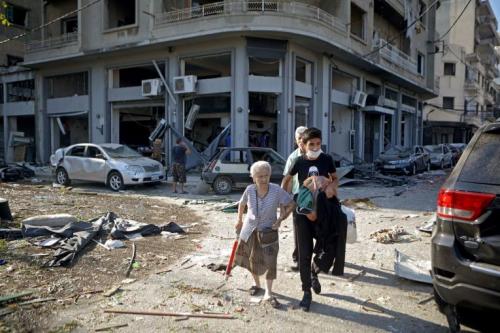80,000 children displaced due to Beirut explosions – UNICEF
UNICEF scales up response and assistance to children and families
Some 80,000 children have been displaced by the Beirut explosions, according to UNICEF estimates, with families affected in desperate need of support..

The explosions on Tuesday evening left 140 people dead, 5,000 injured and hundreds missing. UNICEF is concerned that many children have suffered trauma and remain in shock.
“Over the past 48 hours, UNICEF continued to coordinate closely with authorities and partners on the ground to respond to the urgent needs of families affected, focusing on health, water and the wellbeing of children,” said Violet Speek-Warnery, UNICEF Deputy Representative in Lebanon.
The port of Beirut – where the explosion took place – is the main lifeline of the country. It is now totally destroyed.
According to the latest information:
•There are numerous reports of children who have been separated from family members, some of whom are still missing;
•At least 12 primary healthcare facilities, maternal, immunization and newborn centres in Beirut have been damaged, impacting services for nearly 120,000 people;
•A children’s hospital in the Karantina area, which had a specialized unit treating critical newborns, was destroyed.;
•The remaining operational hospitals are over-stretched and have been depleted of critical medical supplies;
•10 containers stocked by the Ministry of Public Health with personal protective equipment were destroyed;
•Five out of seven UNICEF-supported vaccine cold rooms were destroyed in the blast, affecting critical vaccination programmes;
•Many schools have reported damage in Beirut and the surrounding area, with assessments ongoing into the level of damage;
•In the past 48 hours, 464 new cases of COVID-19 were registered.
“UNICEF is supporting the local authorities and partners. Our teams have been working around the clock to provide people affected with much needed assistance,” said Speek-Warnery.
UNICEF in Lebanon is working with counterparts and partners to scale up support to affected children and their families in order to respond to the immediate needs, including:
•Drinking water was distributed to frontline responders and those living in the directly affected location around the Beirut port;
•Conducting preliminary assessments on warehouses, schools, cold rooms, water infrastructure and health facilities including hospitals and specialize intensive care unit for newborns;
•An estimated 90 per cent of stored vaccines supplies were rescued from the damaged warehouse in the port;
•Supporting the reunification of children who have been separated from their family and the setting up of a hotline;
•Providing psychosocial support to help children cope with bereavement and trauma.
•Working with youth volunteers helping with the clean-up in different areas;
•Establishing a cash transfer programme for temporary housing assistance for families displaced by the loss of their houses.
To be able to respond to these huge immediate needs, UNICEF urgently requires nearly US$4.4 million.
Source:United Nations Children's Fund
- 215 reads
Human Rights
Ringing FOWPAL’s Peace Bell for the World:Nobel Peace Prize Laureates’ Visions and Actions

Protecting the World’s Cultural Diversity for a Sustainable Future

The Peace Bell Resonates at the 27th Eurasian Economic Summit

Declaration of World Day of the Power of Hope Endorsed by People in 158 Nations

Puppet Show I International Friendship Day 2020

